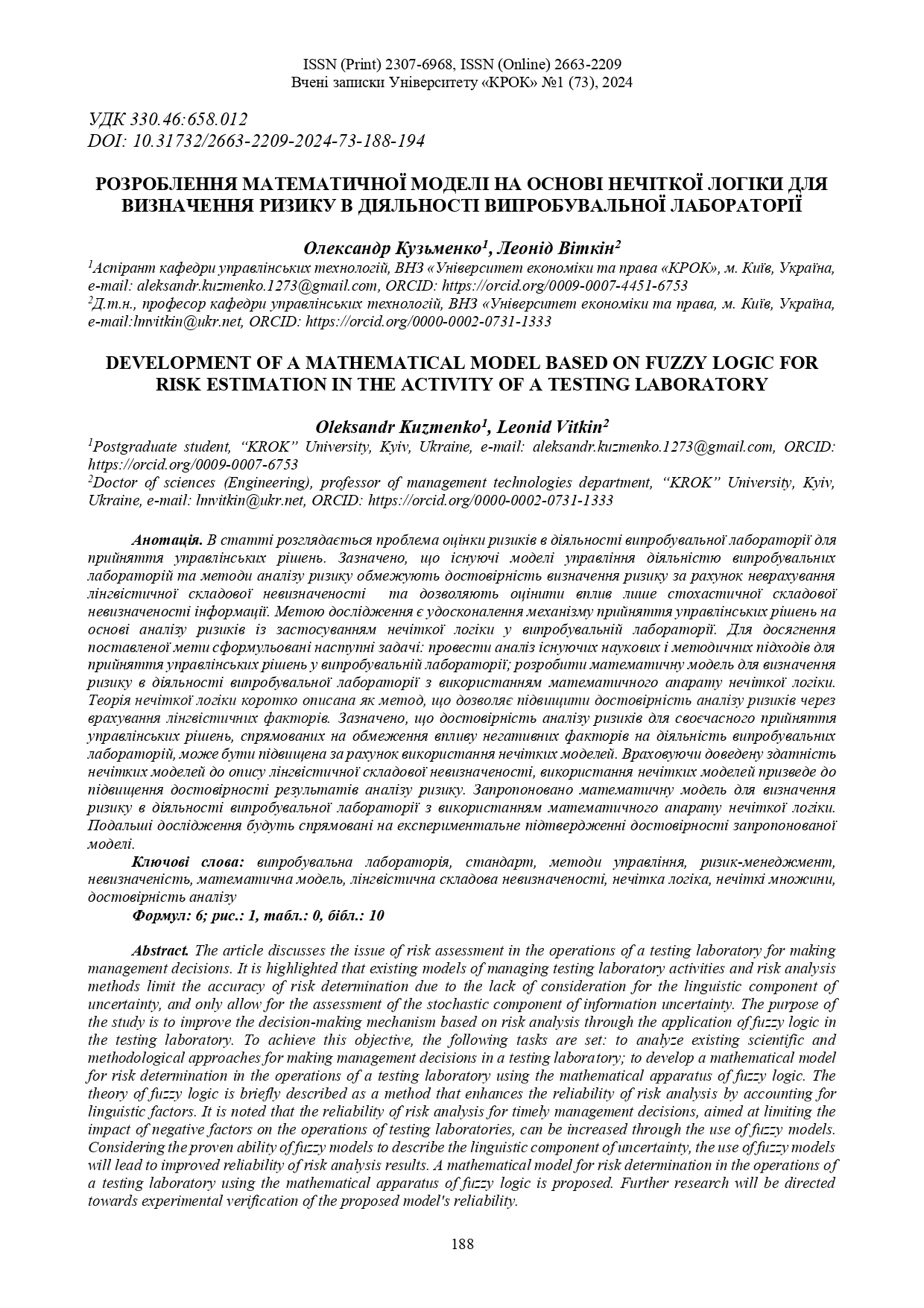DEVELOPMENT OF A MATHEMATICAL MODEL BASED ON FUZZY LOGIC FOR RISK ESTIMATION IN THE ACTIVITY OF A TESTING LABORATORY
DOI:
https://doi.org/10.31732/2663-2209-2024-73-188-194Keywords:
testing laboratory, standard, management methods, risk management, uncertainty, mathematical model, linguistic component of uncertainty, fuzzy logic, fuzzy sets, reliability of analysisAbstract
The article discusses the issue of risk assessment in the operations of a testing laboratory for making management decisions. It is highlighted that existing models of managing testing laboratory activities and risk analysis methods limit the accuracy of risk determination due to the lack of consideration for the linguistic component of uncertainty, and only allow for the assessment of the stochastic component of information uncertainty. The purpose of the study is to improve the decision-making mechanism based on risk analysis through the application of fuzzy logic in the testing laboratory. To achieve this objective, the following tasks are set: to analyze existing scientific and methodological approaches for making management decisions in a testing laboratory; to develop a mathematical model for risk determination in the operations of a testing laboratory using the mathematical apparatus of fuzzy logic. The theory of fuzzy logic is briefly described as a method that enhances the reliability of risk analysis by accounting for linguistic factors. It is noted that the reliability of risk analysis for timely management decisions, aimed at limiting the impact of negative factors on the operations of testing laboratories, can be increased through the use of fuzzy models. Considering the proven ability of fuzzy models to describe the linguistic component of uncertainty, the use of fuzzy models will lead to improved reliability of risk analysis results. A mathematical model for risk determination in the operations of a testing laboratory using the mathematical apparatus of fuzzy logic is proposed. Further research will be directed towards experimental verification of the proposed model's reliability.Downloads
References
ДСТУ EN ISO/IEC 17025:2019 Загальні вимоги до компетентності випробувальних та калібрувальних лабораторій. Київ, 2020. 24 с. Доступ через https://uas.gov.ua.
ДСТУ EN ISO 9001:2018 (EN ISO 9001:2015, IDT; ISO 9001:2015, IDT) Системи управління якістю. Вимоги. Київ, 2018. 44 с. Доступ через https://uas.gov.ua.
ДСТУ ISO 31000:2018 (ISO 31000:2018, IDT) Менеджмент ризиків. Принципи та настанови. Київ, 2019. 19 c. Доступ через https://uas.gov.ua.
ДСТУ IEC/ISO 31010:2013 (IEC/ISO 31010:2009, IDT) Керування ризиком. Методи загального оцінювання ризику. Київ, 2015. 80 с. Доступ через https://uas.gov.ua.
ДСТУ ІSО Guide 73:2013 (ISO Guide 73:2009, IDT) Керування ризиком. Словник термінів. Київ, 2014. 17 с. Доступ через https://uas.gov.ua.
Maryam Gallab, Hafida Bouloiz, Youssef Lamrani Alaoui, Mohamed Tkiouat (2019). Risk Assessment of Maintenance activities using Fuzzy Logic, Procedia Computer Science 148, p. 226-235. URL: https://creativecommons.org/licenses/by-nc-nd/4.0.
Inna Nurutdinova and Luibov Dimitrova (2021). Risk significance assessment on the basis of a fuzzy model. E3s Web of Conferences 273, 08037 (2021). INTERAGROMASH 2021, 7 p. URL: https://doi.org/10.1051/e3sconf/202127308037.
Editor Kailan Shang& Zakir Hossen(Eds.). (2013). Applying Fuzzy Logic to Risk Assessment and Decision-Making. Casualty Actuarial Society. Canadian Institute of Actuaries. Society of Actuaries, 59 p. URL: https:// www.soa.org/493854/globalassets/assets/files/research/projects/research-2013-fuzzy-logic.pdf.
Zadeh L. A. (1999). Fuzzy sets as s basic for theory of possibility. and Fuzzy Sets systems, p. 9-34. URL: https://doi.org/10.1016/S0165-0114 (99)80004-9.
Kosko B. (1994). Fuzzy systems as universal approximates. IEE Transactions on computers, 11, p. 1329-1333. URL: https://sipi.usc.edu/~kosko/Fuzzy Universal Approx.pdf.

Downloads
Published
How to Cite
Issue
Section
License

This work is licensed under a Creative Commons Attribution-NonCommercial 4.0 International License.

